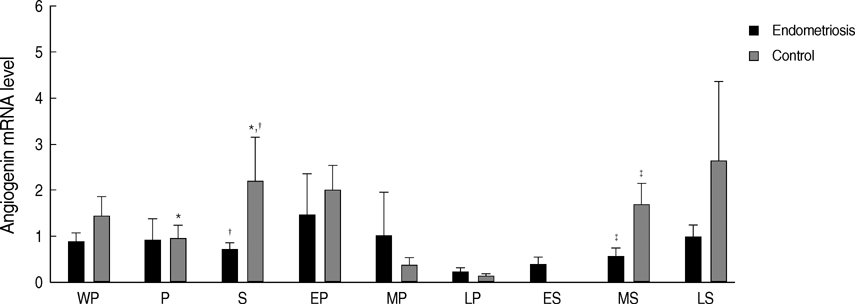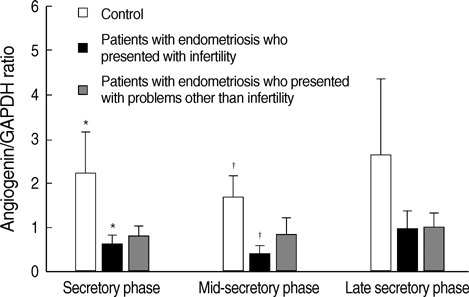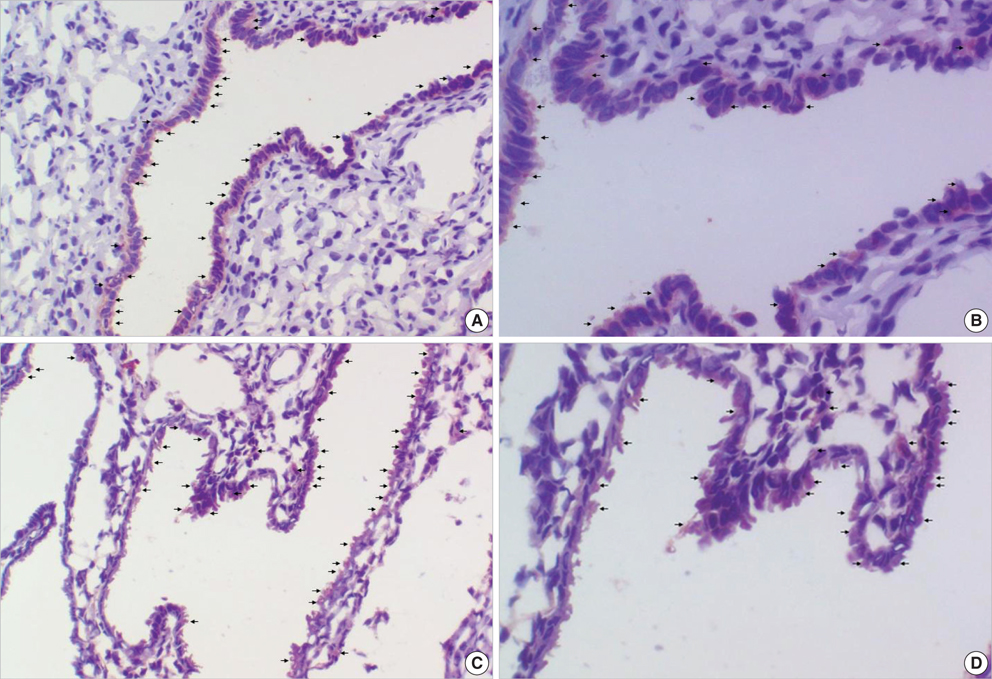J Korean Med Sci.
2008 Oct;23(5):802-807. 10.3346/jkms.2008.23.5.802.
Decreased Expression of Angiogenin in the Eutopic Endometrium from Women with Advanced Stage Endometriosis
- Affiliations
-
- 1Department of Obstetrics and Gynecology, University of Ulsan College of Medicine, Asan Medical Center, Seoul, Korea.
- 2Department of Obstetrics & Gynecology, College of Medicine, the Institute of Reproductive Medicine and Population, Medical Research Center, Seoul National University, Seoul, Korea. ymchoi@snu.ac.kr
- KMID: 1783064
- DOI: http://doi.org/10.3346/jkms.2008.23.5.802
Abstract
- Angiogenin, a potent inducer of angiogenesis, is expressed in human endometrium. This study was performed to compare the expression of angiogenin mRNA level in the eutopic endometrium from women with and without endometriosis. Thirty-two women with advanced stage endometriosis and 29 control women were recruited. Following isolation of total RNA from endometrial tissue and reverse transcription, cDNA samples were amplified by real time polymerase chain reaction to quantify the expression of angiogenin genes. In selected patients, immunohistochemical staining was utilized to localize the area of angiogenin expression. Angiogenin mRNA level was significantly lower in the endometriosis group than in the control group during the secretory phase, especially the mid-secretory phase, and the decline was observed mainly in the women who presented with infertility. Within the endometriosis group, angiogenin mRNA levels did not differ between the proliferative and secretory phases, but, in the control group, the level in the secretory phase was higher than that during the proliferative phase. Immunohistochemistry showed that the glandular epithelial cell layer was decorated positively in both groups. These findings suggest that the relative deficiency of angiogenin expression in the secretory endometrium could impair implantation in women with advanced stage endometriosis.
Keyword
MeSH Terms
Figure
Reference
-
1. Lessey BA, Castelbaum AJ, Sawin SW, Buck CA, Schinnar R, Bilker W, Strom BL. Aberrant integrin expression in the endometrium of women with endometriosis. J Clin Endocrinol Metab. 1994. 79:643–649.
Article2. Healy DL, Rogers PA, Hii L, Wingfield M. Angiogenesis: a new theory for endometriosis. Hum Reprod Update. 1998. 4:736–740.3. Giudice LC, Telles TL, Lobo S, Kao L. The molecular basis for implantation failure in endometriosis: on the road to discovery. Ann N Y Acad Sci. 2002. 955:252–264.4. Kao LC, Germeyer A, Tulac S, Lobo S, Yang JP, Taylor RN, Lessey BA, Giudice LC. Expression profiling of endometrium from women with endometriosis reveals candidate genes for disease-based implantation failure and infertility. Endocrinology. 2003. 144:2870–2881.
Article5. Strydom DJ. The angiogenins. Cell Mol Life Sci. 1998. 54:811–824.
Article6. Koga K, Osuga Y, Tsutsumi O, Yano T, Yoshino O, Takai Y, Matsumi H, Hiroi H, Kugu K, Momoeda M, Fujiwara T, Taketani Y. Demonstration of angiogenin in human endometrium and its enhanced expression in endometrial tissues in the secretory phase and the decidua. J Clin Endocrinol Metab. 2001. 86:5609–5614.
Article7. Noyes RW, Hertig AT, Rock J. Dating the endometrial biopsy. Am J Obstet Gynecol. 1975. 122:262–263.
Article8. Sherer DM, Abulafia O. Angiogenesis during implantation, and placental and early embryonic development. Placenta. 2001. 22:1–13.
Article9. Shifren JL, Tseng JF, Zaloudek CJ, Ryan IP, Meng YG, Ferrara N, Jaffe RB, Taylor RN. Ovarian steroid regulation of vascular endothelial growth factor in the human endometrium: implications for angiogenesis during the menstrual cycle and in the pathogenesis of endometriosis. J Clin Endocrinol Metab. 1996. 81:3112–3118.
Article10. Das SK, Chakraborty I, Wang J, Dey SK, Hoffman LH. Expression of vascular endothelial growth factor (VEGF) and VEGF-receptor messenger ribonucleic acids in the peri-implantation rabbit uterus. Biol Reprod. 1997. 56:1390–1399.11. Lebovic DI, Shifren JL, Ryan IP, Mueller MD, Korn AP, Darney PD, Taylor RN. Ovarian steroid and cytokine modulation of human endometrial angiogenesis. Hum Reprod. 2000. 15S3:67–77.
Article12. Ancelin M, Buteau-Lozano H, Meduri G, Osborne-Pellegrin M, Sordello S, Plouet J, Perrot-Applanat M. A dynamic shift of VEGF isoforms with a transient and selective progesterone-induced expression of VEGF189 regulates angiogenesis and vascular permeability in human uterus. Proc Natl Acad Sci USA. 2002. 99:6023–6028.
Article13. Steff AM, Gagne D, Page M, Rioux A, Hugo P, Gosselin D. Serum concentrations of insulin-like growth factor-1, soluble tumor necrosis factor receptor-1 and angiogenin in endometriosis patients. Am J Reprod Immunol. 2004. 51:166–173.
Article14. Suzumori N, Zhao XX, Suzumori K. Elevated angiogenin levels in the peritoneal fluid of women with endometriosis correlate with the extent of the disorder. Fertil Steril. 2004. 82:93–96.
Article15. Arici A, Tazuke SI, Attar E, Kliman HJ, Olive DL. Interleukin-8 concentration in peritoneal fluid of patients with endometriosis and modulation of interleukin-8 expression in human mesothelial cells. Mol Hum Reprod. 1996. 2:40–45.16. Nisolle M, Casanas-Roux F, Donnez J. Peritoneal endometriosis, ovarian endometriosis and adenomyotic nodules of the rectovaginal septum: a different histopathogenesis? Gynaecol Endoscopy. 1997. 6:203–209.
Article17. Nisolle M, Donnez J. Peritoneal endometriosis, ovarian endometriosis, and adenomyotic nodules of the rectovaginal septum are three different entities. Fertil Steril. 1997. 68:585–596.
Article
- Full Text Links
- Actions
-
Cited
- CITED
-
- Close
- Share
- Similar articles
-
- mRNA Expression Differences of uPA, uPAR in Eutopic Endometrium of Advanced Stage Endometriosis Patients
- Expression of membrane type-2 and -3 matrix metalloproteinases in eutopic endometrium of women with advanced endometriosis
- mRNA Expression of Thrombospondin-1 and -2 in Severe Endometriosis Patients in Korean Women
- Survivin and Bcl-2 expression in eutopic endometrium with and without endometriosis
- Decreased Progesterone Receptor B/A Ratio in Endometrial Cells by Tumor Necrosis Factor-Alpha and Peritoneal Fluid from Patients with Endometriosis




